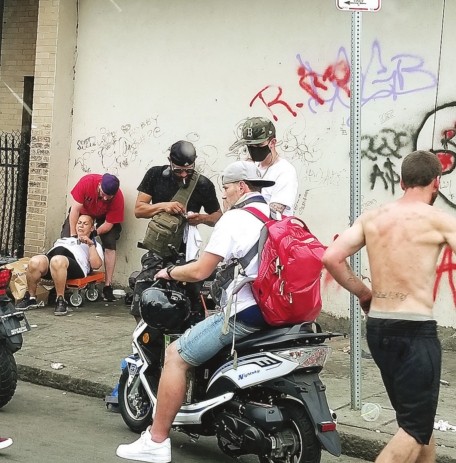
The South End's drug epidemic is imperiling the viability of one of Boston’s key economic engines. Newmarket Square has been the center of substance abuse treatment programs for years, but conditions have rapidly deteriorated in the past year due to Covid-19 lockdowns and a swell in drug distribution.
The many business owners between Massachusetts Avenue and Southampton Street report being regularly threatened or attacked, having their vehicles and buildings defecated in, people wandering the streets high and plummeting sales.
Newmarket Square is home to numerous food processing, manufacturing, and supply companies.
“Seven days a week, 24 hours.
It’s
a very bad situation and getting worse,” said Janett Colombo, owner of
Newmarket Pizza. “[Drug users] don’t care whether it’s public, if there
are kids around, if it’s police. They just do whatever they want.”
“The
last six months, it’s exploded all over again. Now it’s Meth and
Fentanyl, and they make people very animated, very angry, very out
there,” said Newmarket Business Association President Sue Sullivan. “Now
everyone and his brother knows, from all over New England, if you want
to do drugs or sell drugs you come here.”
Sullivan
placed much of the responsibility with law enforcement, who she said
has largely given up trying to stop the public use and sale of drugs.
“We
have a District Attorney who’s been very vocal that she’s not going to
prosecute anything that’s a ‘victimless crime,’” she said. “So there’s
no prosecution for using. And the drug dealers getting arrested are back
out faster than the police can finish making their reports.” The
problems have been compounded by the closure of public restrooms and
services for the homeless that required indoor spaces. Marty Martinez,
chief of Boston’s Health and Human Services Department (HHS), said the
city is rushing to
reopen public services and expand outreach in the area. “There’s no
question the pandemic exacerbated an already challenging situation.
Covid-19 hit and closed day programs and public restrooms, and drove
people into Boston to get care,” he said. “We’re seeing probably double
the number of people on the street that need care and support. Folks are
preying on those individuals and taking advantage of them.”
Boston
HHS is hoping short-term programs can hand off vulnerable people to
more robust support systems, but whether the area can get the long-term
drug treatment centers requested by the Newmarket Business Association
is up to the state. Sheree Marciante, co-owner of Victoria’s diner, may
not be able to wait. She says that like many business owners in
Newmarket, she’s having to consider packing up and leaving.
“It’s
not like it hasn’t crossed our minds. It’s difficult to run a business,
and it’s exceptionally difficult to run a business in this area. More
difficult than most places in Boston,” she said. “People ask online, ‘Is
it safe around there?’ Our families get worried about us because they
think at some point our luck is going to run out.”
Others,
however, aren’t planning on going anywhere. Colombo said the area still
has potential if its recent issues can be resolved.
“I’m
not going to give up,” she said. “Hopefully this is going to change at
some point and my business is going to start picking up. It’s a good
location, and a lot of people like my pizza. There’s a lot of workers
around that I would like to keep serving.”
All
parties contacted agreed that homeless populations themselves weren’t
the problem, and that simply pushing the police to detain people without
targeting the roots of the problem would be counterproductive.
“We’re
not going to arrest our way out of this problem,” said Martinez. “What
we do need to do is arrest the people down there dealing drugs, make
sure they’re not returning back to the street in short order. You have
people struggling in some of the toughest moments of their life
commingling with folks trying to take advantage of them.”